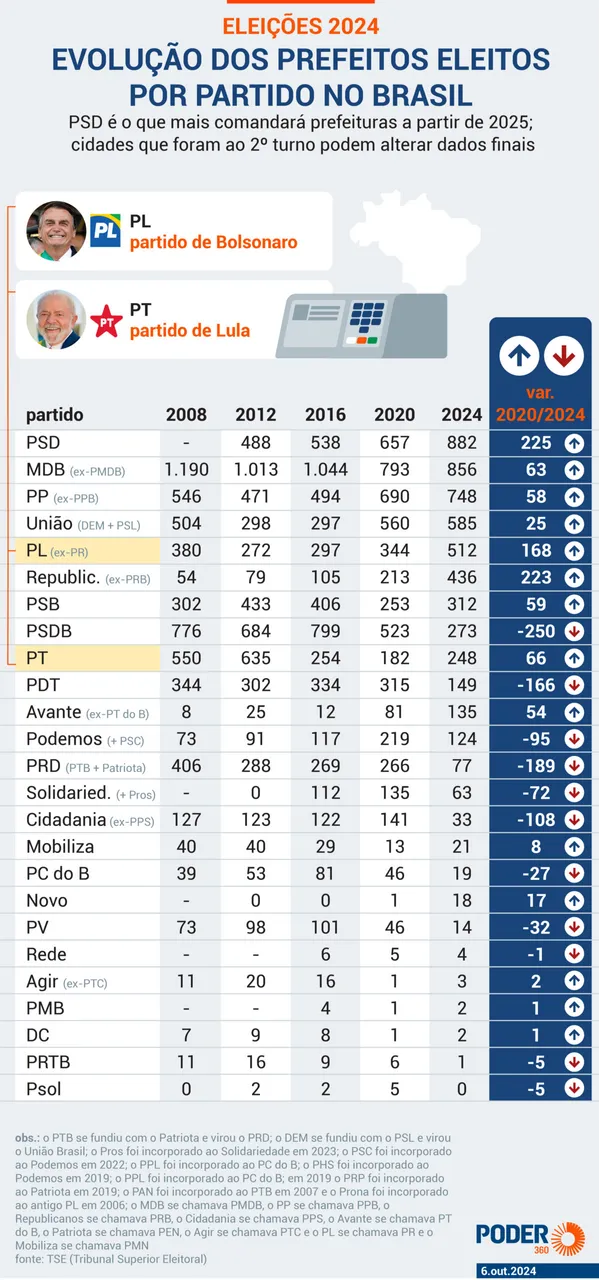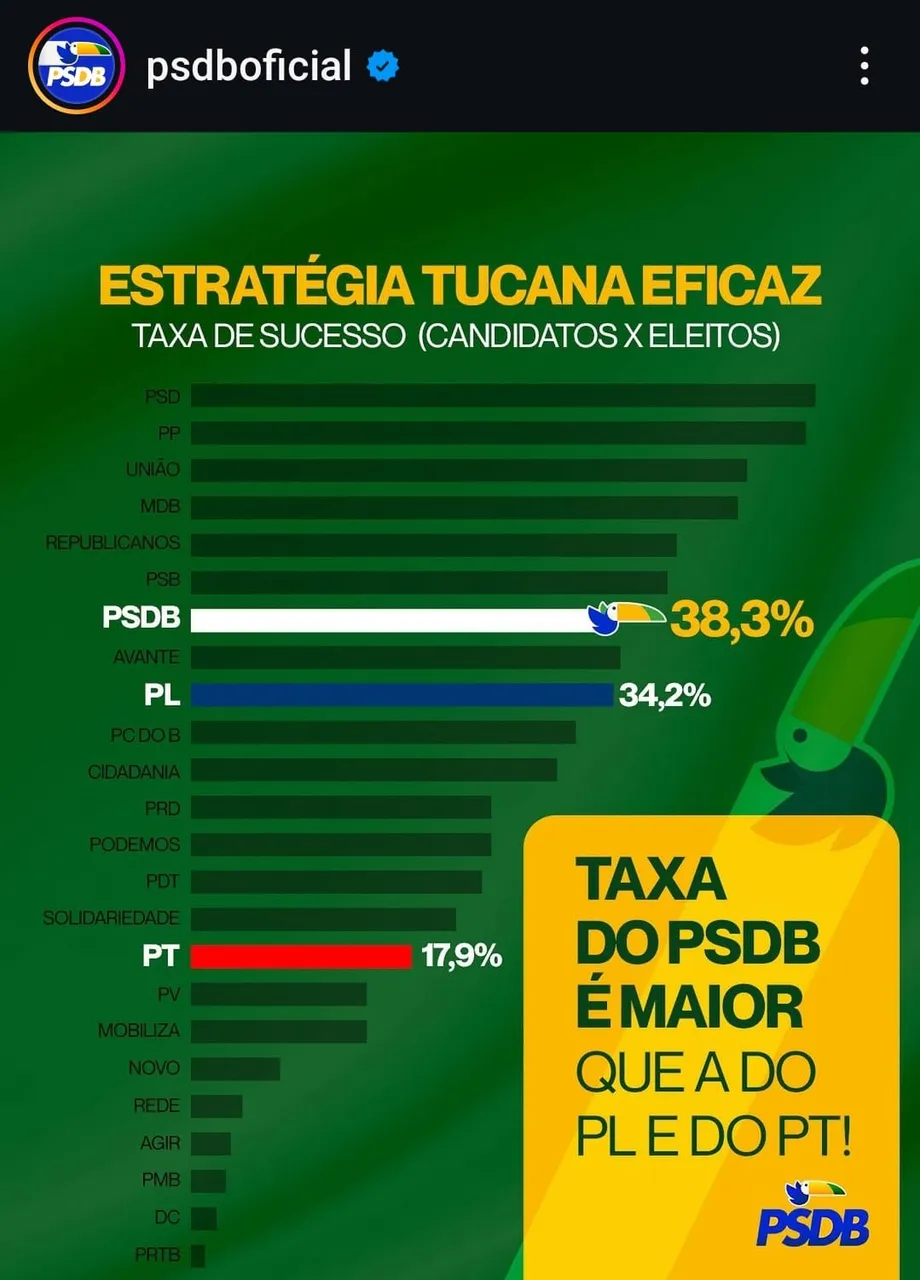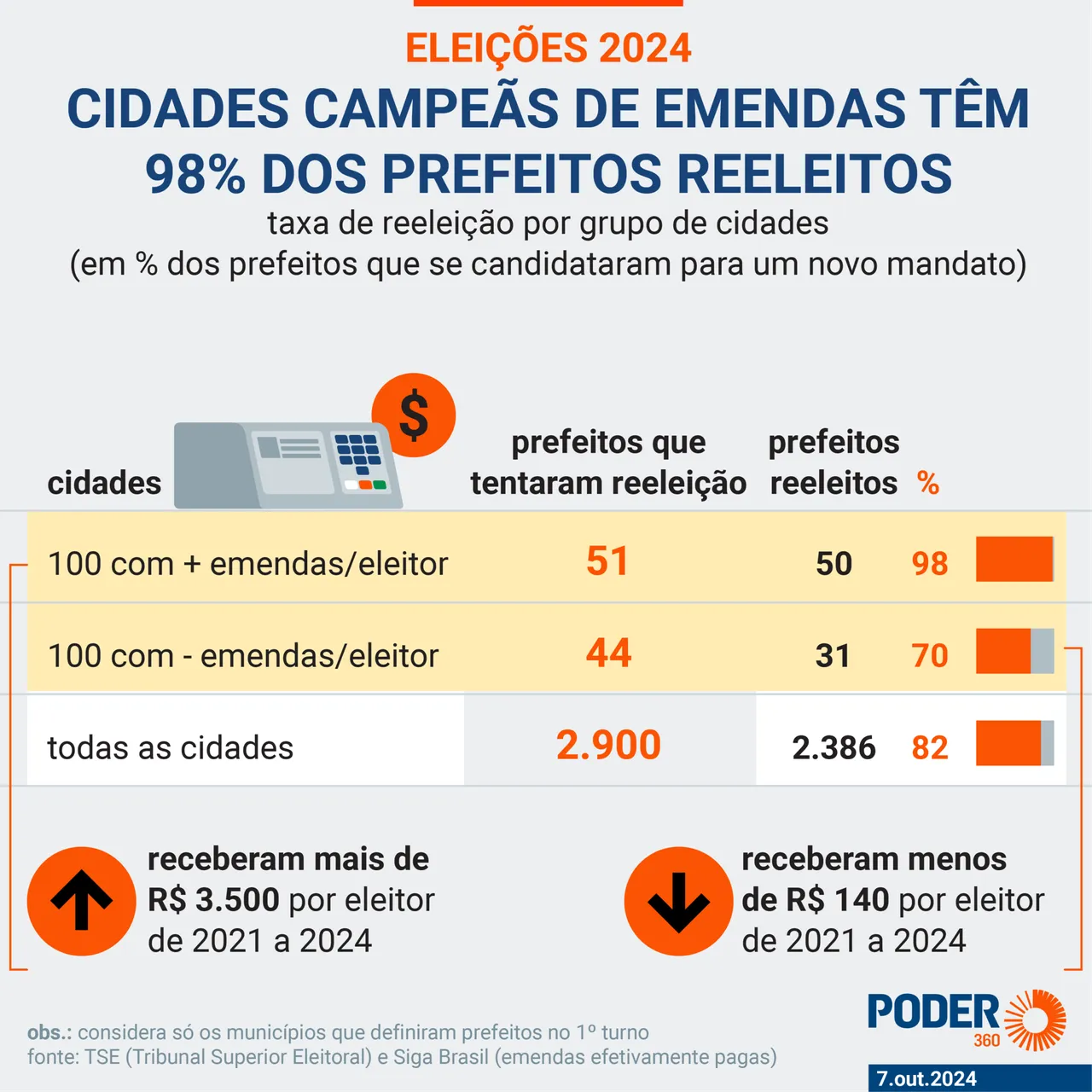
[EN]
The 2024 municipal elections shook up the Brazilian political scene and made it clear: the country's political map is undergoing a complete transformation. And it is no longer the polarization that was the deciding factor in the 2022 elections. In 2024, we saw the right gain ground, traditional politicians stumble, Bolsonaro and Lula test their influence and the strength of the money from parliamentary amendments.

According to the Poder360 graph, we can see that one of the big news was the rise of the right, with Bolsonaro's PL winning city halls and increasing its power in the cities. The Novo and Republicanos parties also showed that they are here to stay.
But some big names felt the blow. The PSDB and PDT, parties that once dominated the political scene, lost strength and influence. It seems that voters are looking for new alternatives and the old leaders are having difficulty adapting.
The PSDB even tried, in a weak way, to claim through its social networks that the small number of mayoral elections is due to the fact that few candidates are running, meaning that they were one of the parties that had a higher success rate than the parties of Lula (PT) and Bolsonaro (PL). Which clearly became a joke among all the other parties.

This claim has become so popular that a certain wing is even advocating the end of the party, instead of continuing to federate/join with smaller parties, since this is not being reflected in votes, and thus reducing the party's political power in Brasília. What attracts the PSDB is money, and without votes they will not have access to the bulk of the money coming from the Party Fund that is distributed according to the number of votes. If they are not getting votes alone, losing almost 50% of the city halls, it will not be by allying with smaller parties that this reality will change.
The 50 million that the PSDB had access to this year seems to be the maximum it will have access to in the near future. It cannot get the votes of the right (which were once theirs), it cannot get the votes of the left, who if they want something more central will vote for the PSB, and it also cannot get the votes of the centrists who now belong to the PSD, MDB, UNIÃO and a little to the PP.
The new fact that we can see in the spreadsheet below is that the PRTB reached almost 100 thousand donors in the campaign, almost 3 times more than the first placed in donations - the MDB with 35,553 - but 95% of these donors will migrate to wherever the candidate, former coach and now politician Pablo Marçal goes and takes his donor base.

Bolsonaro, even without running, threw himself into the campaign, supporting candidates all over Brazil. But, looking at the results, was his support decisive? The truth is that many candidates he supported ended up defeated.
Lula, on the other hand, preferred a more discreet role, focusing on official commitments. And the strategy does not seem to have worked very well: few candidates supported by him managed to get elected.
However, there was one factor that drew attention in these elections: parliamentary amendments, the money that deputies and senators send to their electoral bases. It seems that those who received more amendments had a better chance of being reelected. Is money talking louder than proposals? This is an important issue for democracy and one that needs to be debated.

The 2024 municipal elections were just the beginning. In 2026, we will have elections for president, governors, senators, federal deputies and state deputies. Will the centrão be the big winner again or will polarization return to the federal sphere to elect its representatives?
In the content for subscribers only on my profile at InLeo you have access to my personal view on this last question asked
There is no paywall here, but there is exclusive content for you to help me continue growing.
[PT-BR]
As eleições municipais de 2024 agitaram o cenário político brasileiro e deixaram claro: o mapa político do país está em plena transformação. E ela não é mais a polarização que foi o decisor das eleições de 2022. Em 2024 vimos a direita ganhar terreno, políticos tradicionais tropeçarem, Bolsonaro e Lula testando sua influência e a força do dinheiro das emendas parlamentares.

Conforme o gráfico do Poder360 podemos perceber que o uma das grandes novidades foi a ascensão da direita, com o PL de Bolsonaro conquistando prefeituras e aumentando seu poder nas cidades. O Novo e o Republicanos também mostraram que vieram para ficar.
Mas teve gente grande que sentiu o baque. O PSDB e o PDT, partidos que já dominaram o cenário político, perderam força e influência. Parece que o eleitor está buscando novas alternativas e os caciques de outrora estão com dificuldades de se adaptar.
O PSDB ainda tentou de maneira pífia alegar através de suas redes sociais que a pouca quantidade de prefeituras é pelo fato de poucos candidatos concorrendo, querendo dizer que foram um dos partidos que tiveram taxa de sucesso maiores que os partidos de Lula (PT) e Bolsonaro (PL). O que claramente virou motivo de piada dentre todos os outros partidos.

Tal alegação pegou tão desesperadora que uma certa ala defende até mesmo o fim do partido, ao invés de continuar se federando/coligando com partidos menores, uma vez que isso não está se refletindo em votos, e dessa maneira diminuindo o poder político do partido dentro de Brasília. O que atrai o PSDB é o dinheiro, e sem os votos eles não terão acesso ao grosso do dinheiro vindo do Fundo Partidário que é distribuído conforme a quantidade de votos. Se sozinho não está conseguindo votos, perdendo quase 50% das prefeituras, não será se aliando com partidos menores que essa realidade irá mudar.
Os 50 milhões que o PSDB teve acesso esse ano, parece ser o máximo que ele teve acesso em um futuro próximo, ele não consegue os votos da direita (que outrora eram deles), não consegue os votos da esquerda que se quiserem algo mais central irão votar no PSB, e também não consegue os votos do centrão que agora pertencem ao PSD, MDB, UNIÃO e um pouco ao PP.
O fato novo que podemos ver na planilha abaixo é o PRTB alcançando quase 100 mil doares na campanha, quase 3 vezes mais que o primeiro colocado em doações - o MDB com 35.553 - mas que 95% desses doadores irão migrar para onde o candidato ex-coach e agora político Pablo Marçal for e levar sua base de doadores.

Bolsonaro, mesmo sem concorrer, entrou de cabeça na campanha, apoiando candidatos Brasil afora. Mas, olhando os resultados, será que seu apoio foi decisivo? A verdade é que muitos candidatos que ele apoiou acabaram derrotados.
Já Lula preferiu um papel mais discreto, focando em compromissos oficiais. E a estratégia parece não ter funcionado muito bem: poucos candidatos apoiados por ele conseguiram se eleger.
Porém, teve um fator que chamou a atenção nessas eleições: as emendas parlamentares, aquele dinheiro que deputados e senadores mandam para suas bases eleitorais. Parece que quem recebeu mais emendas teve mais chances de se reeleger. Será que o dinheiro está falando mais alto que as propostas? Essa é uma questão importante para a democracia e que precisa ser debatida.

As eleições municipais de 2024 foram só o começo. Em 2026, teremos eleições para presidente, governadores, senadores, deputados federais e deputados estaduais. Será que o centrão será o grande vencedor novamente ou a polarização voltará na esfera federal para eleger seus representantes?
No conteúdo só para assinantes no meu perfil na InLeo você tem acesso a minha visão pessoal acerca dessa última pergunta feita
Aqui não tem paywall, mas tem conteúdo exclusivo para você me ajudar a continuar crescendo.